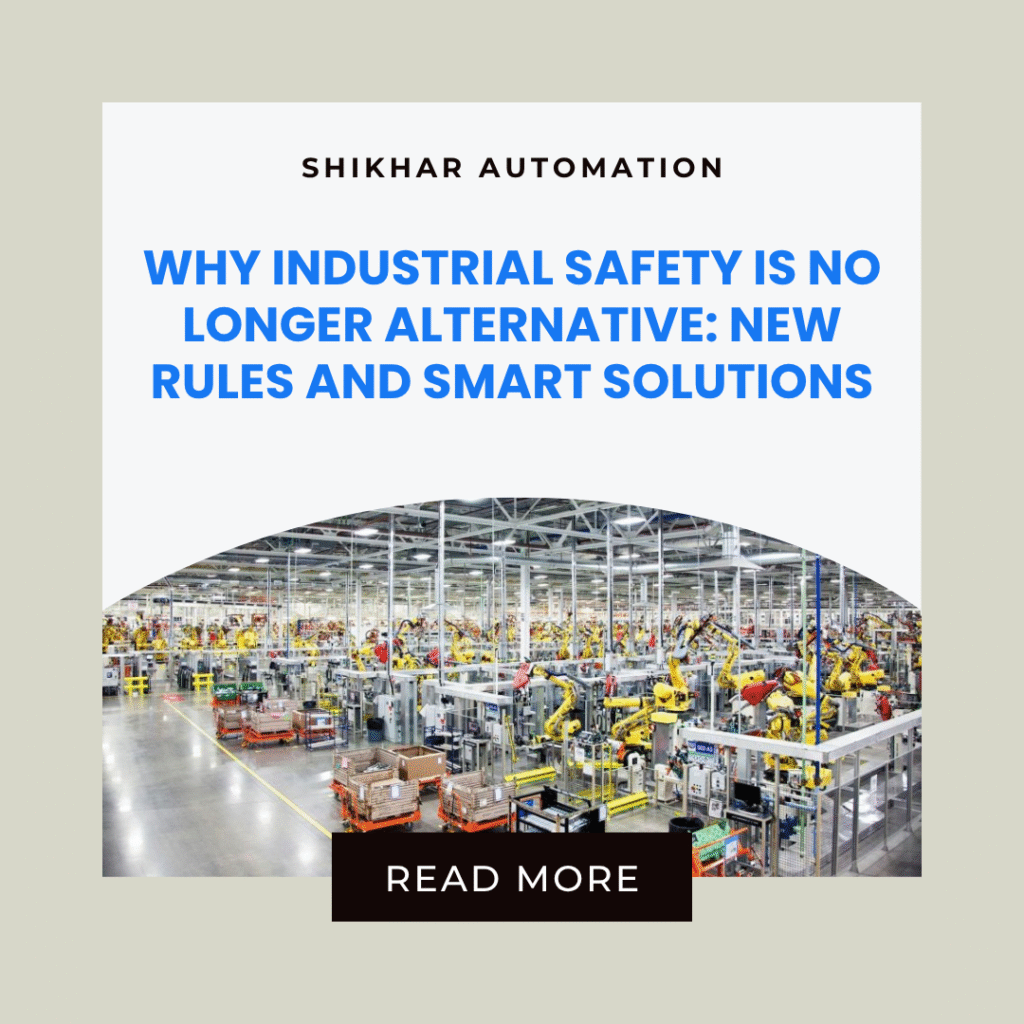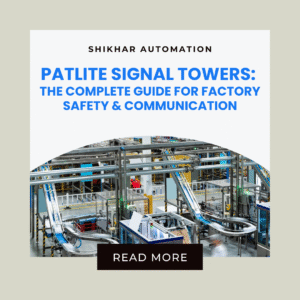In the past, industrial safety was often seen as an alternative ad-on for a secondary anxiety or businesses. Safety rules and guidelines were seen as one of the several aspects of running a factory or industrial plant. However, increasing workplace accidents, progression in technology, and increasing legal and financial results for non-transportation, industrial safety is no longer ignored. In today’s world, it is necessary to follow security protocols and invest in smart safety solutions to remain competitive, durable and legally obedient for any business.
Awareness and enforcement about industrial safety norms
One of the primary drivers behind the change in industrial security approach is the increasing awareness about the importance of workplace security, which is in combination with strict enforcement of rules in industries worldwide. ISO 13849, CE Marking and BIS (Bureau of Indian Standards) have become benchmarks for industrial security. These rules set bar for equipment design, maintenance and operating protocols to ensure safety of workers in potentially dangerous environment.
For example, ISO 13849, especially focused on performance requirements for control systems related to machinery safety and safety. CE marking indicates that the products meet the European Union’s safety, health and environmental protection standards. Similarly, BIS standard ensures that equipment complies with Indian safety and quality norms.
Governments and regulatory bodies worldwide are increasing their investigation on safety protocols, and industries that not only fail to face the risk of fines and legal action, but are also reputed losses that can severely damage their business. The developed landscape of safety rules means that manufacturers and businesses must be up -to -date with the latest standards and best practices to avoid these risks.
Manual security changes in smart safety systems
As industries develop, they do the technologies that support them. Traditional security measures, such as manual safety checks and protective obstacles, are no longer enough to keep with modern manufacturing processes. Today, industries are rapidly moving to smart security systems that are more efficient, reliable, and are able to prevent accidents before occurring.
For example, techniques such as RFID (Radio Frequency Identification) switch, safety relay and light curtains are becoming mainstreams. The RFID switches allow for the real -time tracking and monitoring of the personnel and machinery, ensuring that dangerous areas are clearly marked, and when they enter dangerous areas, workers are alerted. Security relay controls emergency stop circuits and interlock systems, stopping machinery immediately in case of malfunction or violation of security protocols. Light curtains provide a non-contact security solution that uses infrared light beams to create a protective barrier around the machines, if the obstruction is violated, automatically prevents operations.
These smart systems are not only designed to increase security, but also valuable data that can be analyzed to improve security protocols and predict potential risks. Unlike manual security systems, which suffer from human error, automated smart solutions provide precise, scalability and high levels of protection.
Legal and financial risk of ignoring safety
Ignoring safety rules comes with a crowd of legal and financial risks. In many countries, failure to follow security standards is considered a serious offense, and businesses may face significant punishment, including fines, shutdowns and cases.
In addition, accidents in the workplace may cause compensation claims of expensive workers, loss of skilled employees and loss to property and machinery. In cases where negligence is proved, businesses can be held responsible for medical expenditure, legal fee and affected parties for compensation. It can easily run in millions of dollars and have a terrible effect on the company’s lower line.
In addition to the direct costs of non-transportation, the reputation of a business can be severely damaged. A company that is known to cut corners, when it comes to security, is unlikely to maintain the trust of customers, investors or its employees. Safety violations can result in loss of negative media coverage and business that may take years to recover.
In addition, companies that invest in strong security systems often see a decrease in insurance premiums, as their risk profile improves. By reducing safety hazards, businesses can display insurers that they are effectively managing risk, eventually saving on overhead costs.
Vocational advantage of safety compliance
Ensuring compliance with Industrial Safety Rules provides many advantages to businesses that go beyond only legal results. Some major benefits include:
- Less workplace accidents
One of the most important benefits of safety compliance is a decrease in workplace accidents. By implementing modern security systems and following industry standards, businesses can significantly reduce job injuries, fatal and risk of accidents. This, in turn, increases productivity by reducing accidents and injuries.
- Smooth audit and inspection
Businesses ahead of safety rules are better prepared for audit and inspection. With appropriate documentation and compliance with all applied standards, companies can easily pass the regulator check without facing any important issue or punishment. This smooth process ensures that operations continue without unnecessary delays or disruption.
- Employee trust and operational continuity
When business gives priority to security, employees feel valuable and more secure in their roles. This trust leads to high morale, better retention rates and a more productive workforce. Workers are more likely to be loyal to a company that shows their commitment to their good. This, in turn, leads to operational continuity and more stable workforce.
How the Shikhar Automation helps
In rapidly changing industrial scenario, it is important to select the right safety products and solutions. The Shikhar Automation plays an important role in helping automation businesses navigate this complex area. The company provides premium security solutions from major brands such as Samersal, Patlet, and Pepper+Fuchs, ensuring that industries can use high quality, certified security components that align with the latest security standards.
Shikhar Automation provides expert guidance to industries in selecting the most suitable safety products for your operation. Whether it is the RFID switch, a security relay, or a mild curtain, the Shikhar Automation helps the automation businesses to choose products that not only meet regulatory requirements, but also increase overall operations.
In addition, Shikhar Automation provides technical assistance to ensure that the correct installation and application of safety solutions are followed. With the company’s finished stock of certified security components, industries can use the components required for their safety systems with rapid distribution, reduce downtime and maintain professional continuity.
In addition to providing top-level products and technical expertise, the Shikhar Automation ensures that the business is ahead of the curve by placing a list of the latest security components. This active approach means that there is the latest technological progress in security in industries, which helps them to remain obedient and protect their workforce.
conclusion
In today’s industrial scenario, security is no longer optional; This is a requirement. With new rules and clever security solutions, business workplaces can reduce accidents, ensure compliance with legal requirements, and enjoy many business benefits. Shikhar Automation are proceeding by offering premium security solutions and expert assistance, helping industries implement effective security systems and maintain operational continuity. Investment in industrial safety is not only a legal requirement, but also a smart business decision that can pay as increased productivity, employee trusts and long -term success.




